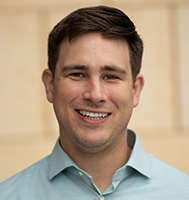Q&A with Benjamin Spector, MD, MS, assistant professor, Division of Nephrology
 Hometown: Seattle, Washington
Hometown: Seattle, Washington
Educational/professional background: I earned my undergraduate degree at the University of Washington before moving to Iowa City, Iowa, for medical school at the University of Iowa Carver College of Medicine and pediatrics residency at the University of Iowa Stead Family Children’s Hospital. I completed my pediatric nephrology fellowship at Children’s Mercy Hospital, during which time I also earned my MS in bioinformatics from the University of Missouri-Kansas City. After my clinical fellowship, I remained at Children’s Mercy Hospital from 2022 to 2023 where I cared for nephrology patients while also completing a postdoctoral research fellowship in epigenetics at the Children’s Mercy Genomic Medicine Center.
Previous position (title, institution): Clinical assistant professor of pediatrics, University of Missouri-Kansas City School of Medicine, Children’s Mercy Hospital, Kansas City, Missouri
What is your field of research or area of clinical care, and how did you get into it? I study the epigenetic basis of acute allograft rejection in kidney transplant recipients. Basic and translational research were important aspects of my undergraduate and medical school experiences. During my pediatric nephrology fellowship, I developed an interest in the genetic basis of kidney diseases. As my training progressed, I learned that I could apply epigenetics to discern pathways of disease and hopefully will be able to harness this information to identify pathophysiologic targets to help our patients.
How would you describe your work to a 5-year-old? The kidneys help by cleaning your blood and making pee. I help kids who have problems with their kidneys.
What attracted you to UW–Madison? My wife is a Wisconsinite, so there was a natural draw for us to explore opportunities at UW–Madison. During this process, I learned that in addition to having supportive colleagues, Wisconsin also offered a wide breadth of established programs to help support my research aspirations.
What is your favorite thing to do in Madison? I enjoy going on hikes with my wife and dog and fly-fishing the local trout streams.
What’s one thing you hope trainees will learn from you and your work? Medical trainees are often intimidated by nephrology, but much of our work comes down to pattern recognition. I hope that by working with me, trainees will learn some basic patterns of common renal pathologies and that they won’t find kidneys as intimidating in the future.
Do you feel your work relates to the Wisconsin Idea? If so, please describe how. Ultimately, my work and research involve perpetual learning. It is my hope that I will be able to embody the Wisconsin Idea by using this new knowledge gained in the clinic or in the lab to help the lives of individuals throughout the state, region, and beyond.
What’s something interesting about your area of expertise you can share that will make us sound smarter during video chats and parties? Each kidney has 500,000 tiny filters that work to clean our blood.
What are some of your hobbies and other interests? I enjoy spending time with my family in the outdoors—hiking, camping, backpacking, and fly-fishing. I also like cooking and baking with my wife.